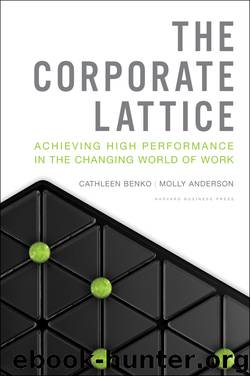The Corporate Lattice: Achieving High Performance in the Changing World of Work by Cathleen Benko & Molly Anderson

Author:Cathleen Benko & Molly Anderson [BENKO, CATHLEEN]
Language: eng
Format: epub
ISBN: 9781422155165
Publisher: Harvard Business Press
Published: 2010-08-03T04:00:00+00:00
ADVANCING LATTICE WAYS OF PARTICIPATING
Ways to participate are constantly emerging and changing, but a number of leading organizations are learning important lessons along the way. Here are some of the most salient.
Let Many Experiments Bloom
Intuit cofounder and Executive Committee chairman Scott Cook has coined the term user-contribution systems to describe the new forms of mass participation we have explored in this chapter.33 The systems allow customers, employees, and sales prospects—or even people with no previous connection to a company—to actively or passively contribute work, expertise, information, or behavioral data to a site that aggregates and automatically converts it into something useful to others, with little or no intervention by an organization.
Intuit learned important lessons from its own efforts to deploy user-contribution systems for mass participation. The Silicon Valley firm, which has eighty-two hundred employees and $3.1 billion in revenues, provides financial software and Web services to consumers, small- to mid-size businesses, financial institutions, and accounting professionals. As Cook readily admits, the notion that people were willing to help his company create value for customers and shareholders for free struck him as “unfathomable.”
Intuit began with a small-scale experiment, creating the free TaxAlmanac forum and wiki, where tax preparers can raise (and answer) often obscure questions. More than 400,000 tax professionals flooded the online space to contribute questions and answers for the benefit of other tax preparers in the Intuit community. The site also has served as an excellent opportunity for Intuit to acquire new customers at little cost.
“It’s about getting out of the conference rooms and actively experimenting,” says Cook. He recommends that companies model many small experiments and then get rapid feedback from customers, employees, and stakeholders.34 Noting that CEOs sometimes fail to properly predict the impact of new products, Cook says that the role of a leader is not to make every decision about the company’s future but instead to create a “culture of experimentation” wherein customers’ votes on small experiments are used to figure out what works.35
Download
This site does not store any files on its server. We only index and link to content provided by other sites. Please contact the content providers to delete copyright contents if any and email us, we'll remove relevant links or contents immediately.
Nudge - Improving Decisions about Health, Wealth, and Happiness by Thaler Sunstein(7692)
Deep Work by Cal Newport(7064)
Principles: Life and Work by Ray Dalio(6421)
The Doodle Revolution by Sunni Brown(4753)
Factfulness: Ten Reasons We're Wrong About the World – and Why Things Are Better Than You Think by Hans Rosling(4733)
Eat That Frog! by Brian Tracy(4526)
Thinking in Bets by Annie Duke(4218)
Hyperfocus by Chris Bailey(4112)
Visual Intelligence by Amy E. Herman(3776)
Writing Your Dissertation in Fifteen Minutes a Day by Joan Bolker(3724)
Ogilvy on Advertising by David Ogilvy(3604)
Hidden Persuasion: 33 psychological influence techniques in advertising by Marc Andrews & Matthijs van Leeuwen & Rick van Baaren(3552)
How to Win Friends and Influence People in the Digital Age by Dale Carnegie & Associates(3547)
How to win friends and influence people by Dale Carnegie(3471)
The Pixar Touch by David A. Price(3431)
Schaum's Quick Guide to Writing Great Short Stories by Margaret Lucke(3374)
Deep Work: Rules for Focused Success in a Distracted World by Cal Newport(3225)
Work Clean by Dan Charnas(3116)
The Slow Fix: Solve Problems, Work Smarter, and Live Better In a World Addicted to Speed by Carl Honore(3007)
